The Future of Nursing: Adapting to Changes in Healthcare Delivery
VerifiedAdded on 2023/04/23
|8
|2077
|302
Essay
AI Summary
This essay examines the expected growth and changes in nursing practice due to the restructuring of the U.S. healthcare delivery system. It discusses the impact of these changes on the continuum of care, including the use of telemedicine and disease management programs. The paper also explores the role of nurses in accountable care organizations, medical homes, and nurse-managed health clinics, emphasizing the importance of primary care and care coordination. Feedback from nurse colleagues highlights the need for additional knowledge, technological adaptation, and improved care coordination to meet the demands of the evolving healthcare landscape, ultimately aiming for quality and cost-effective patient-centered care with a focus on wellness and prevention.
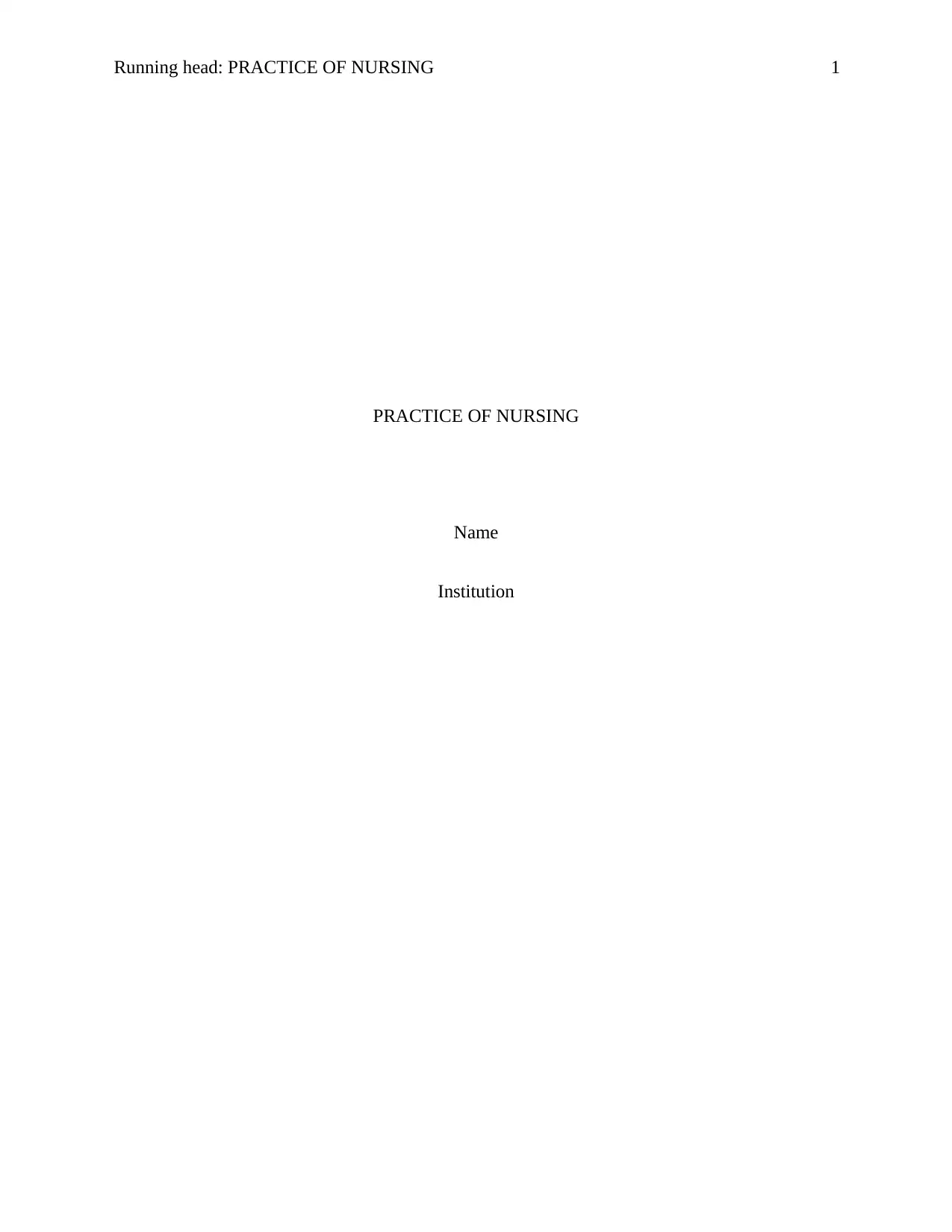
Running head: PRACTICE OF NURSING 1
PRACTICE OF NURSING
Name
Institution
PRACTICE OF NURSING
Name
Institution
Paraphrase This Document
Need a fresh take? Get an instant paraphrase of this document with our AI Paraphraser
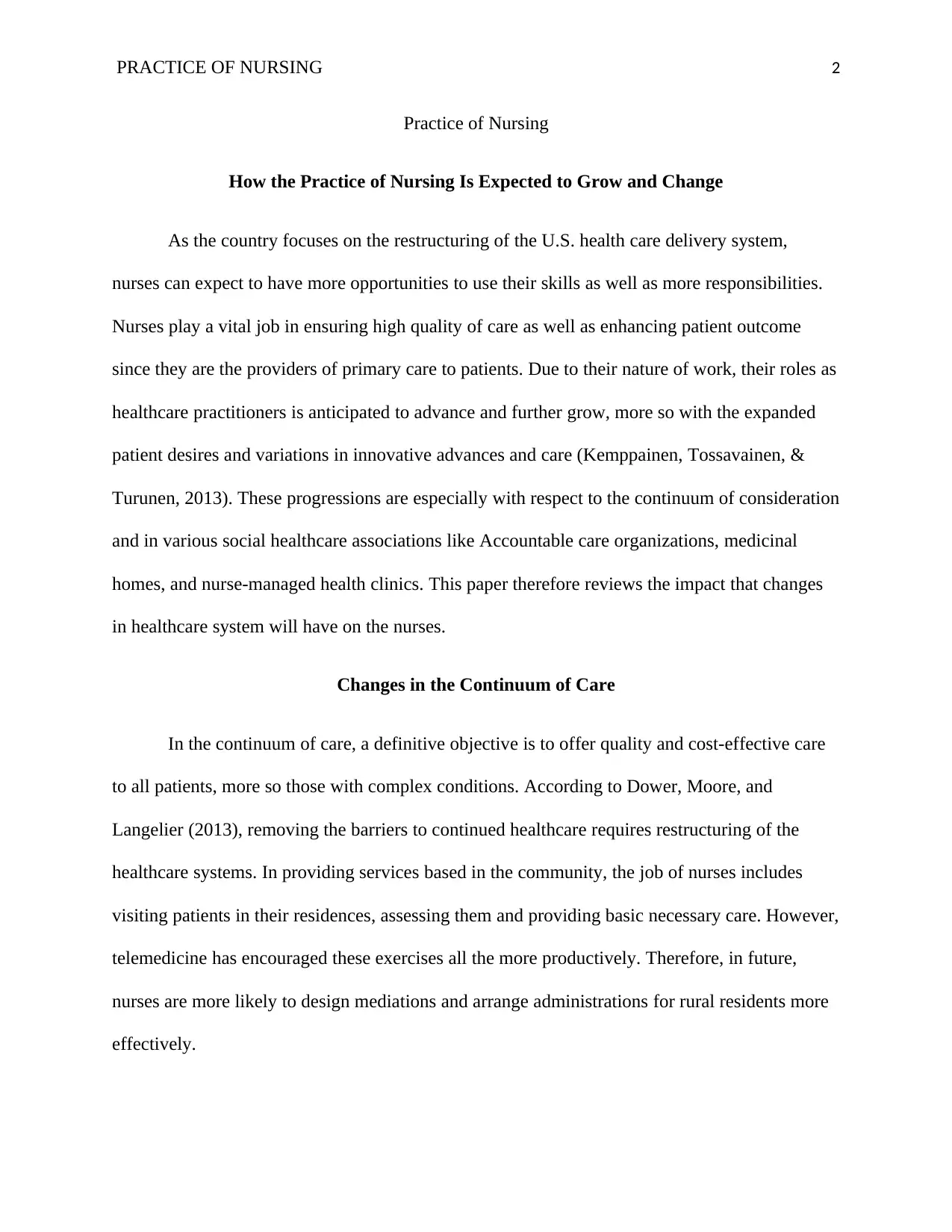
PRACTICE OF NURSING 2
Practice of Nursing
How the Practice of Nursing Is Expected to Grow and Change
As the country focuses on the restructuring of the U.S. health care delivery system,
nurses can expect to have more opportunities to use their skills as well as more responsibilities.
Nurses play a vital job in ensuring high quality of care as well as enhancing patient outcome
since they are the providers of primary care to patients. Due to their nature of work, their roles as
healthcare practitioners is anticipated to advance and further grow, more so with the expanded
patient desires and variations in innovative advances and care (Kemppainen, Tossavainen, &
Turunen, 2013). These progressions are especially with respect to the continuum of consideration
and in various social healthcare associations like Accountable care organizations, medicinal
homes, and nurse-managed health clinics. This paper therefore reviews the impact that changes
in healthcare system will have on the nurses.
Changes in the Continuum of Care
In the continuum of care, a definitive objective is to offer quality and cost-effective care
to all patients, more so those with complex conditions. According to Dower, Moore, and
Langelier (2013), removing the barriers to continued healthcare requires restructuring of the
healthcare systems. In providing services based in the community, the job of nurses includes
visiting patients in their residences, assessing them and providing basic necessary care. However,
telemedicine has encouraged these exercises all the more productively. Therefore, in future,
nurses are more likely to design mediations and arrange administrations for rural residents more
effectively.
Practice of Nursing
How the Practice of Nursing Is Expected to Grow and Change
As the country focuses on the restructuring of the U.S. health care delivery system,
nurses can expect to have more opportunities to use their skills as well as more responsibilities.
Nurses play a vital job in ensuring high quality of care as well as enhancing patient outcome
since they are the providers of primary care to patients. Due to their nature of work, their roles as
healthcare practitioners is anticipated to advance and further grow, more so with the expanded
patient desires and variations in innovative advances and care (Kemppainen, Tossavainen, &
Turunen, 2013). These progressions are especially with respect to the continuum of consideration
and in various social healthcare associations like Accountable care organizations, medicinal
homes, and nurse-managed health clinics. This paper therefore reviews the impact that changes
in healthcare system will have on the nurses.
Changes in the Continuum of Care
In the continuum of care, a definitive objective is to offer quality and cost-effective care
to all patients, more so those with complex conditions. According to Dower, Moore, and
Langelier (2013), removing the barriers to continued healthcare requires restructuring of the
healthcare systems. In providing services based in the community, the job of nurses includes
visiting patients in their residences, assessing them and providing basic necessary care. However,
telemedicine has encouraged these exercises all the more productively. Therefore, in future,
nurses are more likely to design mediations and arrange administrations for rural residents more
effectively.
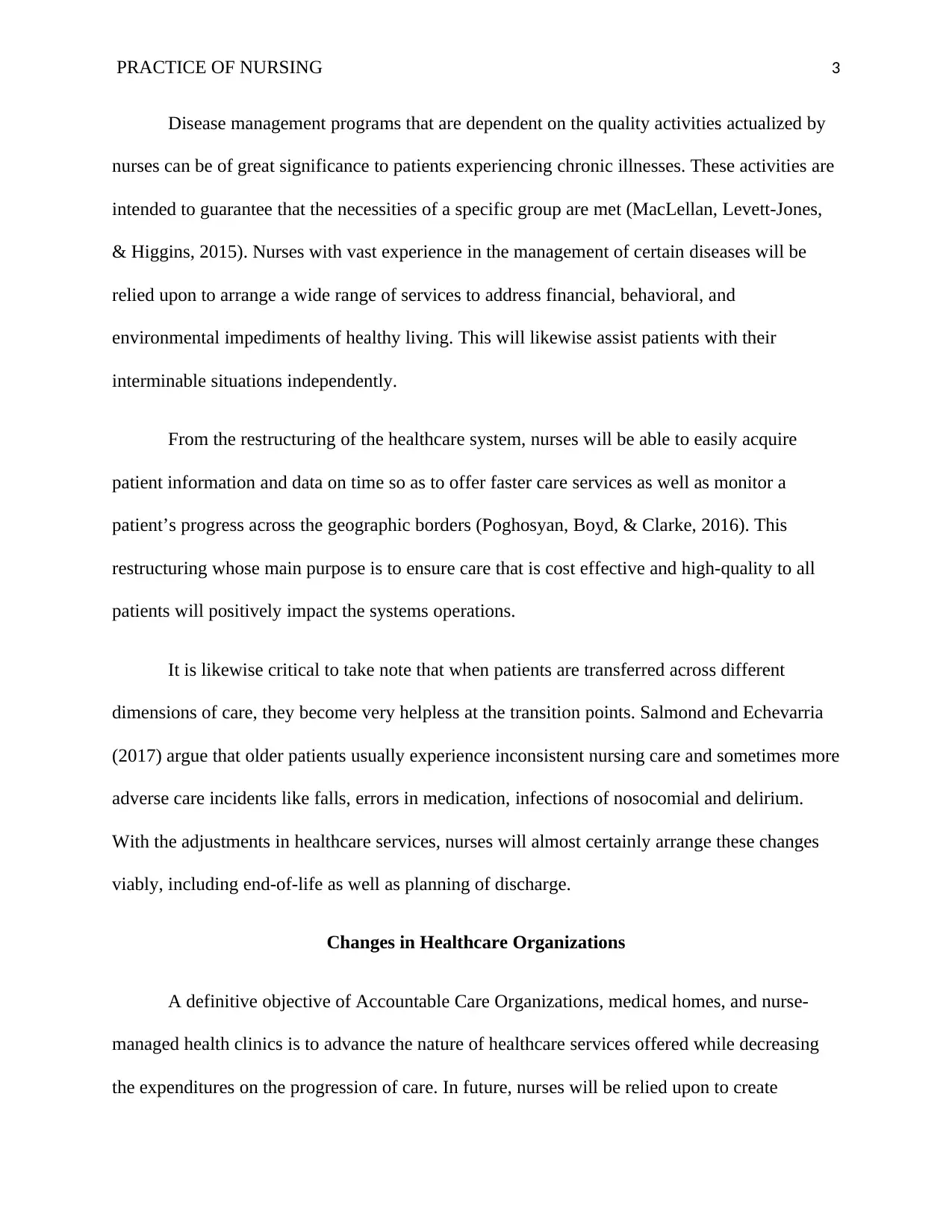
PRACTICE OF NURSING 3
Disease management programs that are dependent on the quality activities actualized by
nurses can be of great significance to patients experiencing chronic illnesses. These activities are
intended to guarantee that the necessities of a specific group are met (MacLellan, Levett‐Jones,
& Higgins, 2015). Nurses with vast experience in the management of certain diseases will be
relied upon to arrange a wide range of services to address financial, behavioral, and
environmental impediments of healthy living. This will likewise assist patients with their
interminable situations independently.
From the restructuring of the healthcare system, nurses will be able to easily acquire
patient information and data on time so as to offer faster care services as well as monitor a
patient’s progress across the geographic borders (Poghosyan, Boyd, & Clarke, 2016). This
restructuring whose main purpose is to ensure care that is cost effective and high-quality to all
patients will positively impact the systems operations.
It is likewise critical to take note that when patients are transferred across different
dimensions of care, they become very helpless at the transition points. Salmond and Echevarria
(2017) argue that older patients usually experience inconsistent nursing care and sometimes more
adverse care incidents like falls, errors in medication, infections of nosocomial and delirium.
With the adjustments in healthcare services, nurses will almost certainly arrange these changes
viably, including end-of-life as well as planning of discharge.
Changes in Healthcare Organizations
A definitive objective of Accountable Care Organizations, medical homes, and nurse-
managed health clinics is to advance the nature of healthcare services offered while decreasing
the expenditures on the progression of care. In future, nurses will be relied upon to create
Disease management programs that are dependent on the quality activities actualized by
nurses can be of great significance to patients experiencing chronic illnesses. These activities are
intended to guarantee that the necessities of a specific group are met (MacLellan, Levett‐Jones,
& Higgins, 2015). Nurses with vast experience in the management of certain diseases will be
relied upon to arrange a wide range of services to address financial, behavioral, and
environmental impediments of healthy living. This will likewise assist patients with their
interminable situations independently.
From the restructuring of the healthcare system, nurses will be able to easily acquire
patient information and data on time so as to offer faster care services as well as monitor a
patient’s progress across the geographic borders (Poghosyan, Boyd, & Clarke, 2016). This
restructuring whose main purpose is to ensure care that is cost effective and high-quality to all
patients will positively impact the systems operations.
It is likewise critical to take note that when patients are transferred across different
dimensions of care, they become very helpless at the transition points. Salmond and Echevarria
(2017) argue that older patients usually experience inconsistent nursing care and sometimes more
adverse care incidents like falls, errors in medication, infections of nosocomial and delirium.
With the adjustments in healthcare services, nurses will almost certainly arrange these changes
viably, including end-of-life as well as planning of discharge.
Changes in Healthcare Organizations
A definitive objective of Accountable Care Organizations, medical homes, and nurse-
managed health clinics is to advance the nature of healthcare services offered while decreasing
the expenditures on the progression of care. In future, nurses will be relied upon to create
⊘ This is a preview!⊘
Do you want full access?
Subscribe today to unlock all pages.

Trusted by 1+ million students worldwide
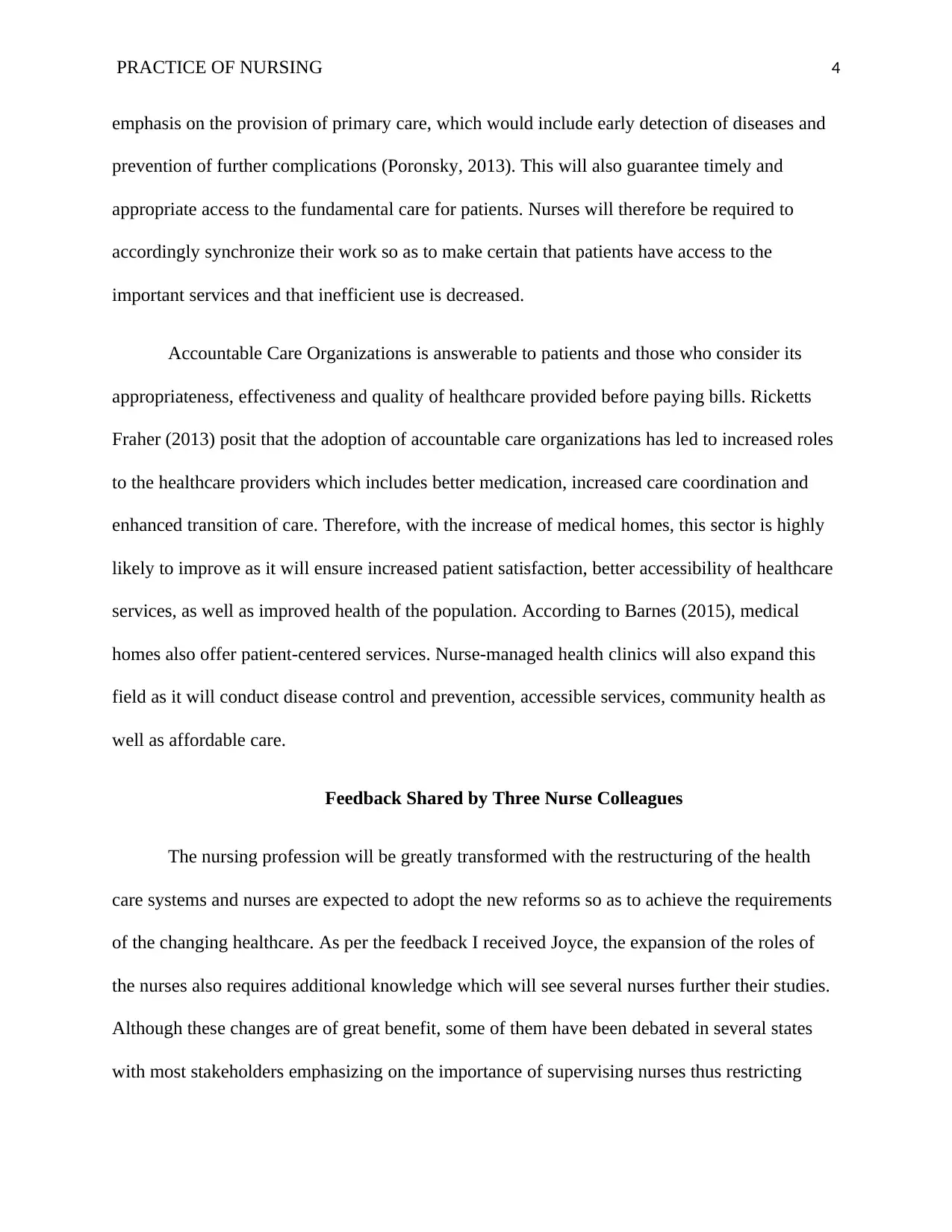
PRACTICE OF NURSING 4
emphasis on the provision of primary care, which would include early detection of diseases and
prevention of further complications (Poronsky, 2013). This will also guarantee timely and
appropriate access to the fundamental care for patients. Nurses will therefore be required to
accordingly synchronize their work so as to make certain that patients have access to the
important services and that inefficient use is decreased.
Accountable Care Organizations is answerable to patients and those who consider its
appropriateness, effectiveness and quality of healthcare provided before paying bills. Ricketts
Fraher (2013) posit that the adoption of accountable care organizations has led to increased roles
to the healthcare providers which includes better medication, increased care coordination and
enhanced transition of care. Therefore, with the increase of medical homes, this sector is highly
likely to improve as it will ensure increased patient satisfaction, better accessibility of healthcare
services, as well as improved health of the population. According to Barnes (2015), medical
homes also offer patient-centered services. Nurse-managed health clinics will also expand this
field as it will conduct disease control and prevention, accessible services, community health as
well as affordable care.
Feedback Shared by Three Nurse Colleagues
The nursing profession will be greatly transformed with the restructuring of the health
care systems and nurses are expected to adopt the new reforms so as to achieve the requirements
of the changing healthcare. As per the feedback I received Joyce, the expansion of the roles of
the nurses also requires additional knowledge which will see several nurses further their studies.
Although these changes are of great benefit, some of them have been debated in several states
with most stakeholders emphasizing on the importance of supervising nurses thus restricting
emphasis on the provision of primary care, which would include early detection of diseases and
prevention of further complications (Poronsky, 2013). This will also guarantee timely and
appropriate access to the fundamental care for patients. Nurses will therefore be required to
accordingly synchronize their work so as to make certain that patients have access to the
important services and that inefficient use is decreased.
Accountable Care Organizations is answerable to patients and those who consider its
appropriateness, effectiveness and quality of healthcare provided before paying bills. Ricketts
Fraher (2013) posit that the adoption of accountable care organizations has led to increased roles
to the healthcare providers which includes better medication, increased care coordination and
enhanced transition of care. Therefore, with the increase of medical homes, this sector is highly
likely to improve as it will ensure increased patient satisfaction, better accessibility of healthcare
services, as well as improved health of the population. According to Barnes (2015), medical
homes also offer patient-centered services. Nurse-managed health clinics will also expand this
field as it will conduct disease control and prevention, accessible services, community health as
well as affordable care.
Feedback Shared by Three Nurse Colleagues
The nursing profession will be greatly transformed with the restructuring of the health
care systems and nurses are expected to adopt the new reforms so as to achieve the requirements
of the changing healthcare. As per the feedback I received Joyce, the expansion of the roles of
the nurses also requires additional knowledge which will see several nurses further their studies.
Although these changes are of great benefit, some of them have been debated in several states
with most stakeholders emphasizing on the importance of supervising nurses thus restricting
Paraphrase This Document
Need a fresh take? Get an instant paraphrase of this document with our AI Paraphraser
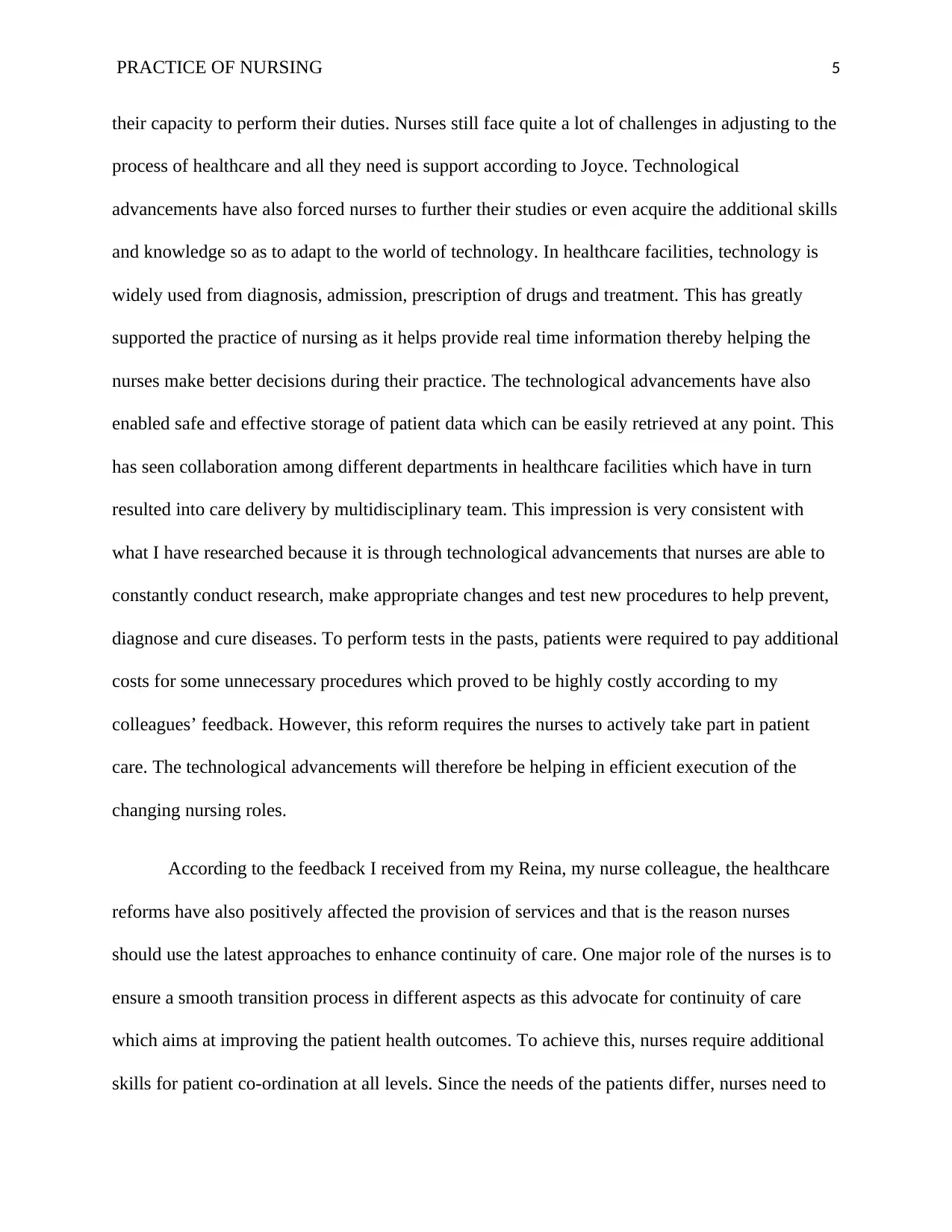
PRACTICE OF NURSING 5
their capacity to perform their duties. Nurses still face quite a lot of challenges in adjusting to the
process of healthcare and all they need is support according to Joyce. Technological
advancements have also forced nurses to further their studies or even acquire the additional skills
and knowledge so as to adapt to the world of technology. In healthcare facilities, technology is
widely used from diagnosis, admission, prescription of drugs and treatment. This has greatly
supported the practice of nursing as it helps provide real time information thereby helping the
nurses make better decisions during their practice. The technological advancements have also
enabled safe and effective storage of patient data which can be easily retrieved at any point. This
has seen collaboration among different departments in healthcare facilities which have in turn
resulted into care delivery by multidisciplinary team. This impression is very consistent with
what I have researched because it is through technological advancements that nurses are able to
constantly conduct research, make appropriate changes and test new procedures to help prevent,
diagnose and cure diseases. To perform tests in the pasts, patients were required to pay additional
costs for some unnecessary procedures which proved to be highly costly according to my
colleagues’ feedback. However, this reform requires the nurses to actively take part in patient
care. The technological advancements will therefore be helping in efficient execution of the
changing nursing roles.
According to the feedback I received from my Reina, my nurse colleague, the healthcare
reforms have also positively affected the provision of services and that is the reason nurses
should use the latest approaches to enhance continuity of care. One major role of the nurses is to
ensure a smooth transition process in different aspects as this advocate for continuity of care
which aims at improving the patient health outcomes. To achieve this, nurses require additional
skills for patient co-ordination at all levels. Since the needs of the patients differ, nurses need to
their capacity to perform their duties. Nurses still face quite a lot of challenges in adjusting to the
process of healthcare and all they need is support according to Joyce. Technological
advancements have also forced nurses to further their studies or even acquire the additional skills
and knowledge so as to adapt to the world of technology. In healthcare facilities, technology is
widely used from diagnosis, admission, prescription of drugs and treatment. This has greatly
supported the practice of nursing as it helps provide real time information thereby helping the
nurses make better decisions during their practice. The technological advancements have also
enabled safe and effective storage of patient data which can be easily retrieved at any point. This
has seen collaboration among different departments in healthcare facilities which have in turn
resulted into care delivery by multidisciplinary team. This impression is very consistent with
what I have researched because it is through technological advancements that nurses are able to
constantly conduct research, make appropriate changes and test new procedures to help prevent,
diagnose and cure diseases. To perform tests in the pasts, patients were required to pay additional
costs for some unnecessary procedures which proved to be highly costly according to my
colleagues’ feedback. However, this reform requires the nurses to actively take part in patient
care. The technological advancements will therefore be helping in efficient execution of the
changing nursing roles.
According to the feedback I received from my Reina, my nurse colleague, the healthcare
reforms have also positively affected the provision of services and that is the reason nurses
should use the latest approaches to enhance continuity of care. One major role of the nurses is to
ensure a smooth transition process in different aspects as this advocate for continuity of care
which aims at improving the patient health outcomes. To achieve this, nurses require additional
skills for patient co-ordination at all levels. Since the needs of the patients differ, nurses need to
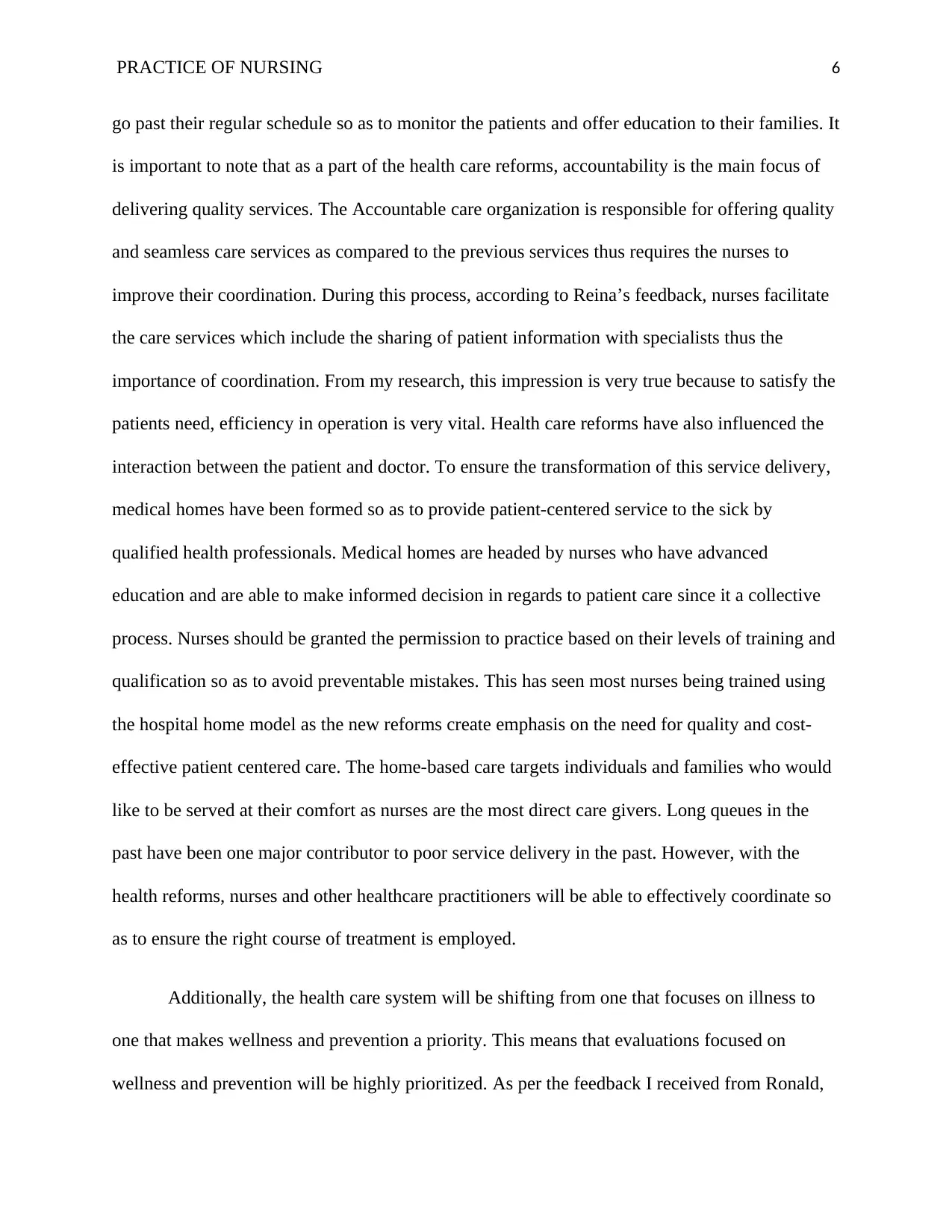
PRACTICE OF NURSING 6
go past their regular schedule so as to monitor the patients and offer education to their families. It
is important to note that as a part of the health care reforms, accountability is the main focus of
delivering quality services. The Accountable care organization is responsible for offering quality
and seamless care services as compared to the previous services thus requires the nurses to
improve their coordination. During this process, according to Reina’s feedback, nurses facilitate
the care services which include the sharing of patient information with specialists thus the
importance of coordination. From my research, this impression is very true because to satisfy the
patients need, efficiency in operation is very vital. Health care reforms have also influenced the
interaction between the patient and doctor. To ensure the transformation of this service delivery,
medical homes have been formed so as to provide patient-centered service to the sick by
qualified health professionals. Medical homes are headed by nurses who have advanced
education and are able to make informed decision in regards to patient care since it a collective
process. Nurses should be granted the permission to practice based on their levels of training and
qualification so as to avoid preventable mistakes. This has seen most nurses being trained using
the hospital home model as the new reforms create emphasis on the need for quality and cost-
effective patient centered care. The home-based care targets individuals and families who would
like to be served at their comfort as nurses are the most direct care givers. Long queues in the
past have been one major contributor to poor service delivery in the past. However, with the
health reforms, nurses and other healthcare practitioners will be able to effectively coordinate so
as to ensure the right course of treatment is employed.
Additionally, the health care system will be shifting from one that focuses on illness to
one that makes wellness and prevention a priority. This means that evaluations focused on
wellness and prevention will be highly prioritized. As per the feedback I received from Ronald,
go past their regular schedule so as to monitor the patients and offer education to their families. It
is important to note that as a part of the health care reforms, accountability is the main focus of
delivering quality services. The Accountable care organization is responsible for offering quality
and seamless care services as compared to the previous services thus requires the nurses to
improve their coordination. During this process, according to Reina’s feedback, nurses facilitate
the care services which include the sharing of patient information with specialists thus the
importance of coordination. From my research, this impression is very true because to satisfy the
patients need, efficiency in operation is very vital. Health care reforms have also influenced the
interaction between the patient and doctor. To ensure the transformation of this service delivery,
medical homes have been formed so as to provide patient-centered service to the sick by
qualified health professionals. Medical homes are headed by nurses who have advanced
education and are able to make informed decision in regards to patient care since it a collective
process. Nurses should be granted the permission to practice based on their levels of training and
qualification so as to avoid preventable mistakes. This has seen most nurses being trained using
the hospital home model as the new reforms create emphasis on the need for quality and cost-
effective patient centered care. The home-based care targets individuals and families who would
like to be served at their comfort as nurses are the most direct care givers. Long queues in the
past have been one major contributor to poor service delivery in the past. However, with the
health reforms, nurses and other healthcare practitioners will be able to effectively coordinate so
as to ensure the right course of treatment is employed.
Additionally, the health care system will be shifting from one that focuses on illness to
one that makes wellness and prevention a priority. This means that evaluations focused on
wellness and prevention will be highly prioritized. As per the feedback I received from Ronald,
⊘ This is a preview!⊘
Do you want full access?
Subscribe today to unlock all pages.

Trusted by 1+ million students worldwide
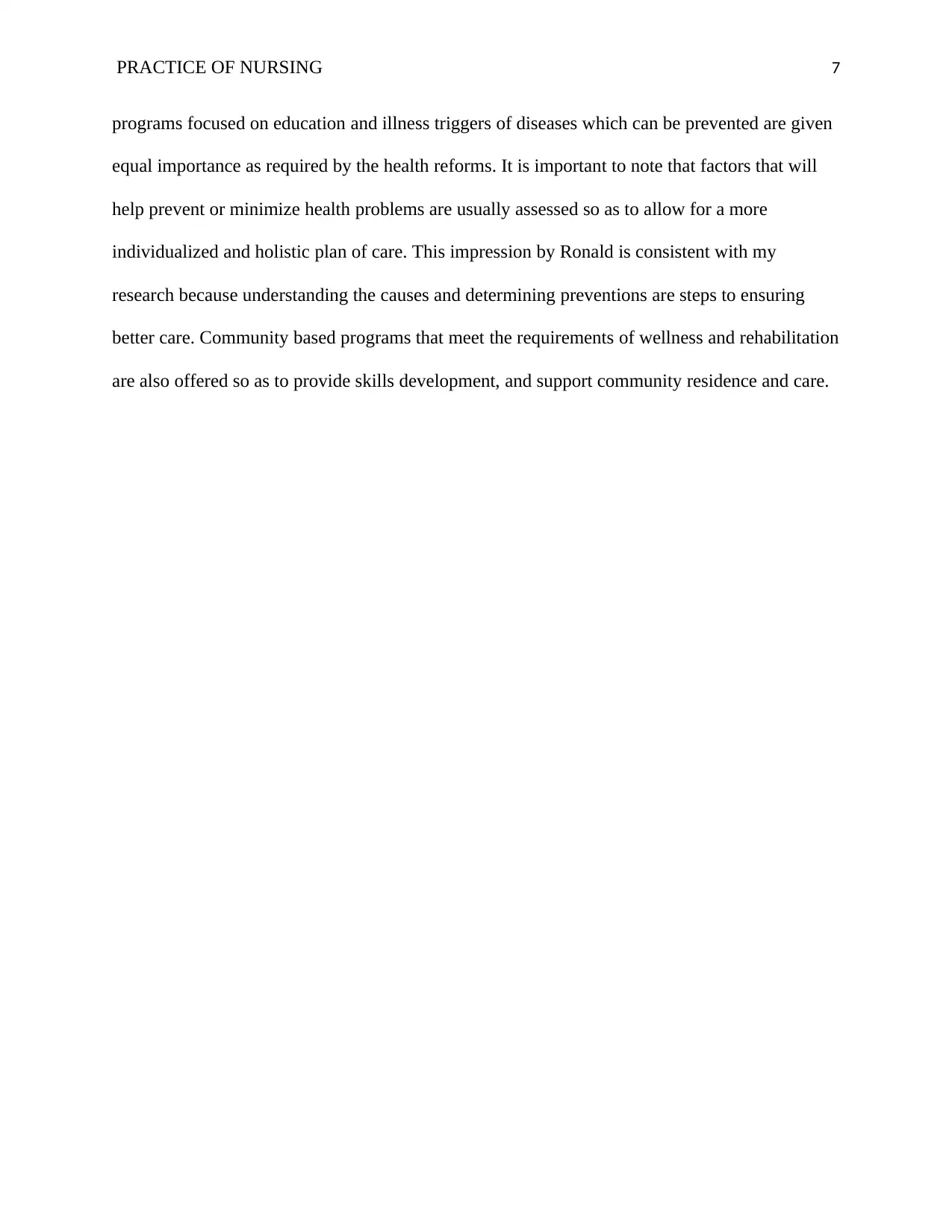
PRACTICE OF NURSING 7
programs focused on education and illness triggers of diseases which can be prevented are given
equal importance as required by the health reforms. It is important to note that factors that will
help prevent or minimize health problems are usually assessed so as to allow for a more
individualized and holistic plan of care. This impression by Ronald is consistent with my
research because understanding the causes and determining preventions are steps to ensuring
better care. Community based programs that meet the requirements of wellness and rehabilitation
are also offered so as to provide skills development, and support community residence and care.
programs focused on education and illness triggers of diseases which can be prevented are given
equal importance as required by the health reforms. It is important to note that factors that will
help prevent or minimize health problems are usually assessed so as to allow for a more
individualized and holistic plan of care. This impression by Ronald is consistent with my
research because understanding the causes and determining preventions are steps to ensuring
better care. Community based programs that meet the requirements of wellness and rehabilitation
are also offered so as to provide skills development, and support community residence and care.
Paraphrase This Document
Need a fresh take? Get an instant paraphrase of this document with our AI Paraphraser
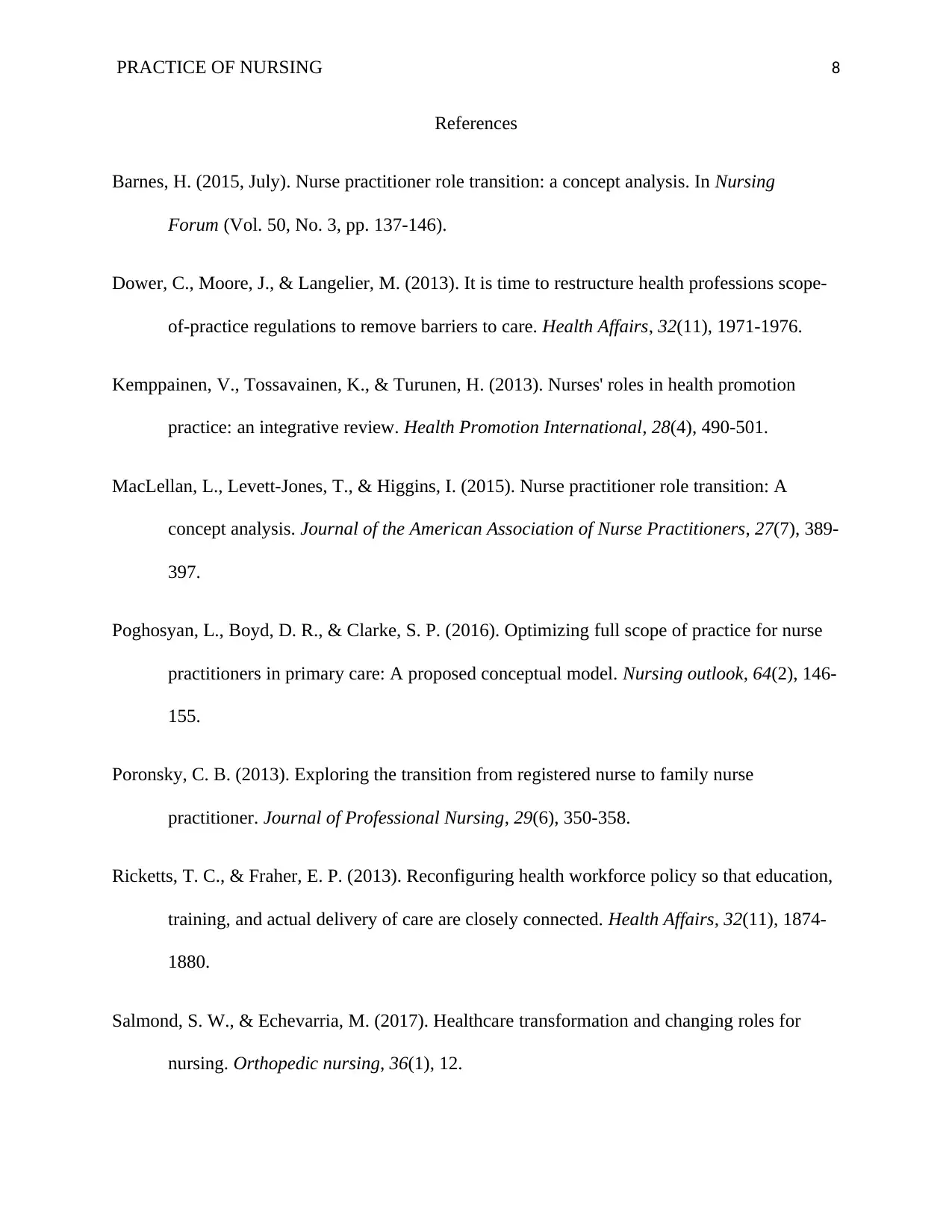
PRACTICE OF NURSING 8
References
Barnes, H. (2015, July). Nurse practitioner role transition: a concept analysis. In Nursing
Forum (Vol. 50, No. 3, pp. 137-146).
Dower, C., Moore, J., & Langelier, M. (2013). It is time to restructure health professions scope-
of-practice regulations to remove barriers to care. Health Affairs, 32(11), 1971-1976.
Kemppainen, V., Tossavainen, K., & Turunen, H. (2013). Nurses' roles in health promotion
practice: an integrative review. Health Promotion International, 28(4), 490-501.
MacLellan, L., Levett‐Jones, T., & Higgins, I. (2015). Nurse practitioner role transition: A
concept analysis. Journal of the American Association of Nurse Practitioners, 27(7), 389-
397.
Poghosyan, L., Boyd, D. R., & Clarke, S. P. (2016). Optimizing full scope of practice for nurse
practitioners in primary care: A proposed conceptual model. Nursing outlook, 64(2), 146-
155.
Poronsky, C. B. (2013). Exploring the transition from registered nurse to family nurse
practitioner. Journal of Professional Nursing, 29(6), 350-358.
Ricketts, T. C., & Fraher, E. P. (2013). Reconfiguring health workforce policy so that education,
training, and actual delivery of care are closely connected. Health Affairs, 32(11), 1874-
1880.
Salmond, S. W., & Echevarria, M. (2017). Healthcare transformation and changing roles for
nursing. Orthopedic nursing, 36(1), 12.
References
Barnes, H. (2015, July). Nurse practitioner role transition: a concept analysis. In Nursing
Forum (Vol. 50, No. 3, pp. 137-146).
Dower, C., Moore, J., & Langelier, M. (2013). It is time to restructure health professions scope-
of-practice regulations to remove barriers to care. Health Affairs, 32(11), 1971-1976.
Kemppainen, V., Tossavainen, K., & Turunen, H. (2013). Nurses' roles in health promotion
practice: an integrative review. Health Promotion International, 28(4), 490-501.
MacLellan, L., Levett‐Jones, T., & Higgins, I. (2015). Nurse practitioner role transition: A
concept analysis. Journal of the American Association of Nurse Practitioners, 27(7), 389-
397.
Poghosyan, L., Boyd, D. R., & Clarke, S. P. (2016). Optimizing full scope of practice for nurse
practitioners in primary care: A proposed conceptual model. Nursing outlook, 64(2), 146-
155.
Poronsky, C. B. (2013). Exploring the transition from registered nurse to family nurse
practitioner. Journal of Professional Nursing, 29(6), 350-358.
Ricketts, T. C., & Fraher, E. P. (2013). Reconfiguring health workforce policy so that education,
training, and actual delivery of care are closely connected. Health Affairs, 32(11), 1874-
1880.
Salmond, S. W., & Echevarria, M. (2017). Healthcare transformation and changing roles for
nursing. Orthopedic nursing, 36(1), 12.
1 out of 8
Related Documents
Your All-in-One AI-Powered Toolkit for Academic Success.
+13062052269
info@desklib.com
Available 24*7 on WhatsApp / Email
![[object Object]](/_next/static/media/star-bottom.7253800d.svg)
Unlock your academic potential
Copyright © 2020–2026 A2Z Services. All Rights Reserved. Developed and managed by ZUCOL.




